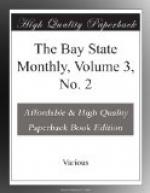Socially, his influence was constantly exerted in the promotion of whatever would elevate and improve the aims and habits of his townsmen. He was active in the movement for the establishment of a Library which should be open to all; in the absence of an Academy, he favored the introduction of a High School.
He constructed sidewalks, and along the streets, so far as he had control, shade trees were planted by his direction. He was also careful to maintain the amenities of life, prompt in meeting and reciprocating all social obligations. Somewhat above the medium height, erect but spare in figure, there was a mingling of dignity and sweetness in his expression which won your confidence. The promptness and despatch, which distinguished his methods of business, were manifest in the general ordering of his affairs. The practical forecast, which, anticipates the crowding of engagements, and maps out the work, was seen in the distribution of his occupations. The materials were in readiness for every workman’s alloted task. Without formal designation, there was time for study, or the performance of civil or social duty, in the busiest season. It entered into his plans to maintain an order in his reading and recreations. His farm, his buildings, tools, equipage, and the whole estate, were kept in excellent condition. Without lavish expenditure, his premises wore an air of neatness and thrift. He was uneasy if his animals were exposed to ill treatment, and he tolerated no waste. With such habits, it was pleasant to be associated with him in any service. You had not to wait for him. He remembered his appointments. He was in his seat in the sanctuary before the opening of the service. No special message was required to secure his attendance at town meeting. The power of his example was elevating and wholesome, and as we review his life and deplore the loss of his presence and cooperation, it is interesting to hear the frequent and hearty testimonials to his kindness, and fairmindedness coming from men who were long in his employment; while others gratefully acknowledge his friendly counsel and assistance in their youthful days.
In politics, Deacon David was Whig and Republican; he believed in the policy of protecting American manufactures, and, during the most active period of his life, his opinions were in harmony with the sentiments of Mr. Webster. With the dissolution of the Whig party, and the undeniable intention on the part of the South to extend the area of slavery, he became a staunch Republican. On the election of Lincoln he put forth his best endeavors to maintain the government, and when the call was made for troops, he was among the foremost to pledge himself and all that he had to sustain the imperilled cause of Liberty. He encouraged his sons to enlist in the army and two of them entered the military service of the country.




